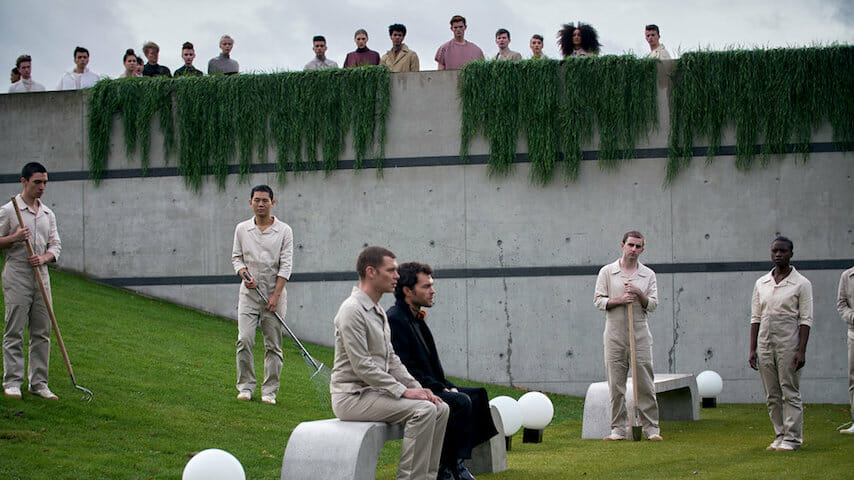Brave New World: What Defines a Dystopian TV Show?
Peacock’s adaptation of Aldous Huxley’s Brave New World is a dystopia disguised as a utopia. But what is a dystopia anyway?
Photo Courtesy of Peacock
The opening moments of the new Peacock series Brave New World are bleak.
And by that I mean that they’re literally just white text on a black screen that forces the audience to understand and accept the Terms and Conditions of this show’s new world order. In this futuristic society, our modern-day concerns like privacy and monogamy are done for—and everyone better be happy about it.
But then, like a visual double-dose of Xanax, the warning labels give way to a world of genetically coded humans living and working inside what is known as New London. Here, it’s nothing but a life-sized, sparkling clean terrarium of beiges, silvers, and whites that shimmer under a sunny skyline.
“I guess we are a utopian show, in that it’s about a utopia,” showrunner and creator David Wiener says of what sets his adaptation of author Aldous Huxley’s prescient 1932 novel apart from its more obviously anxiety-producing, dystopian TV brethren like Hulu’s The Handmaid’s Tale and Amazon’s The Man in the High Castle. There, the weather always appears to be dark and gloomy, perhaps because the government rulers feel zero culpability in publicly maiming, torturing, and killing their citizens in the name of what they believe to be the greater good.
Wiener adds, “Huxley was so concerned that people would become so stimulated through sex or so numb through drugs or so distracted by media and entertainment that they wouldn’t look inside themselves or look outside themselves in an uncomfortable way” and that “our story of dystopia is the dystopia that this place makes inside people.”
In adapting the novel, Wiener says it was important to him and his team to acknowledge that stories of dystopia and speculative fiction “come with this whole set of tropes.” And “instead of trying to dismiss them,” they wanted to figure out “how can we take those tropes that are familiar and do them in a deliciously weird way?”
So, is it correct to even call Brave New World a dystopian story?
“People often assume that dystopia is the opposite of a utopia when, in fact, the relationship tends to be much more complicated. I generally argue that they are better viewed as siblings with the same parents,” says Sean P. Connors, an associate professor of English education at the University of Arkansas who lectures and writes on dystopian fiction—and who is also an avowed fan of The CW’s dystopian drama The 100.
He adds that a utopia “is a society that has perfected human behavior. And, to perfect human behavior, you have to control it. And that inevitably entails a loss of freedom.”
Because, as Connors points out, one person’s utopia can quickly and easily be another’s dystopia.
“I think we see that logic at work today in American society in the sense that Donald Trump’s vision of a great America resonates with a portion of the electorate. But, for a lot more people, it understandably elicits feelings of repulsion, if not horror.”
-

-

-

-

-

-

-

-

-

-

-

-

-

-

-

-

-

-

-

-

-

-

-

-

-

-

-

-

-

-

-

-

-

-

-

-

-

-

-

-








































